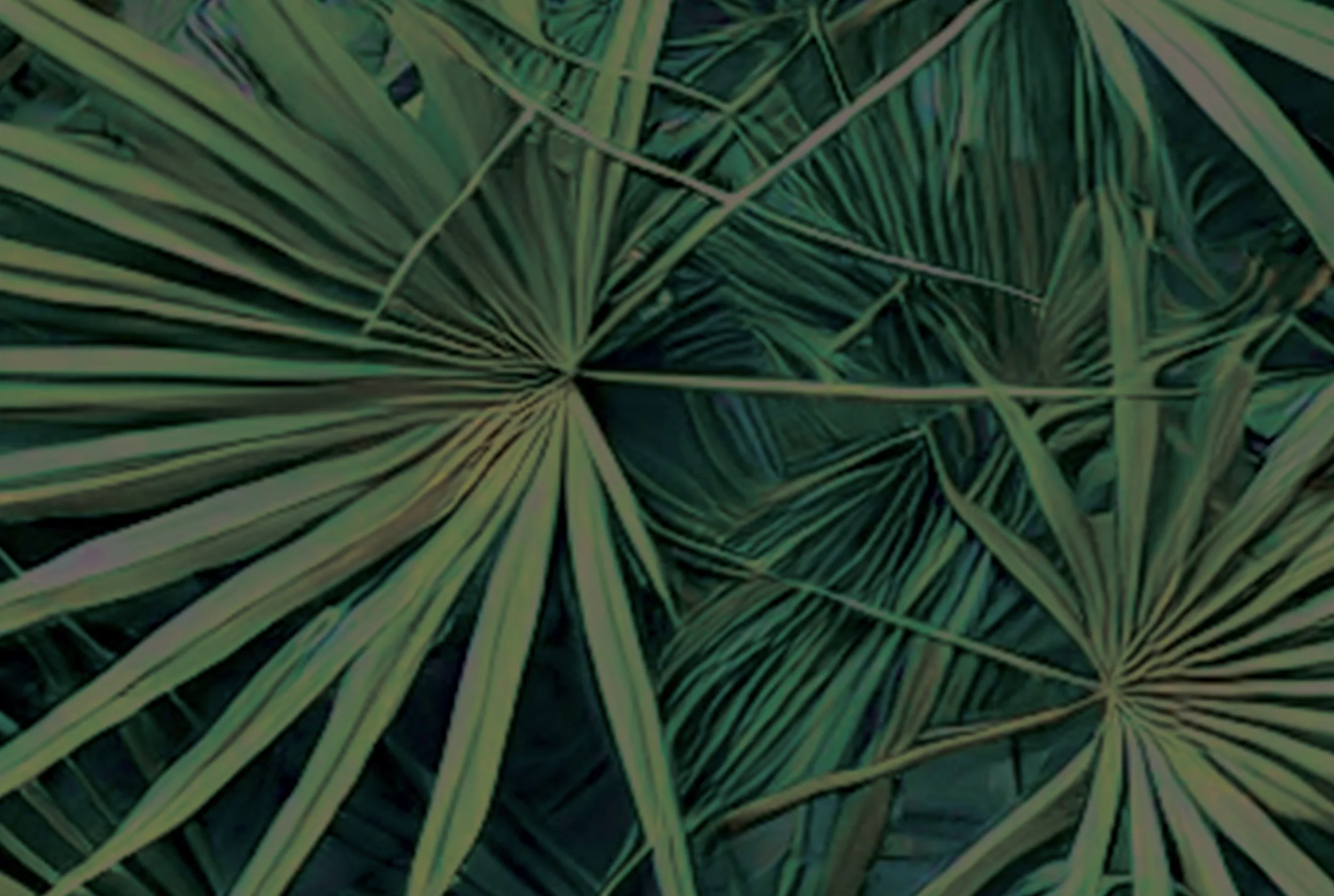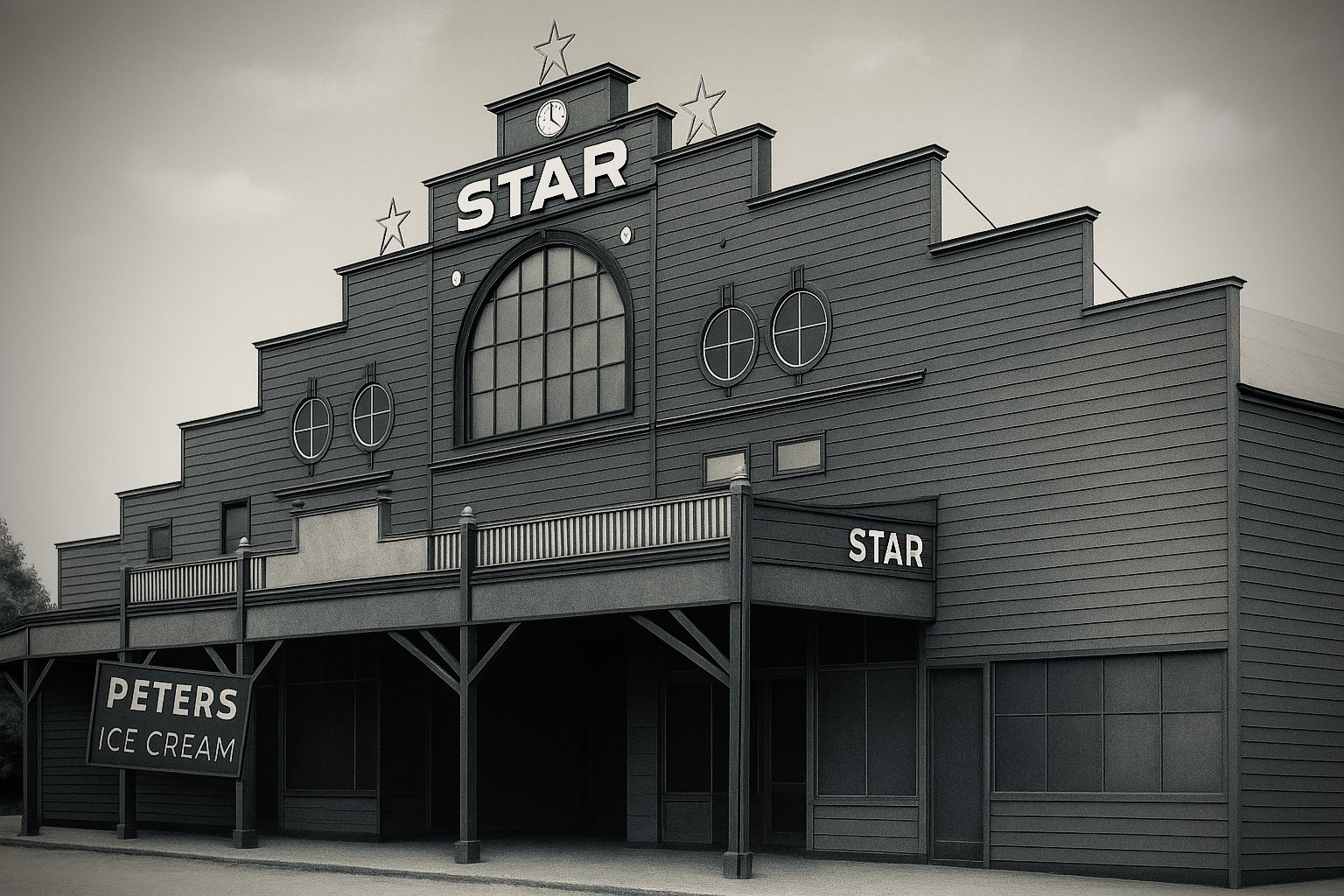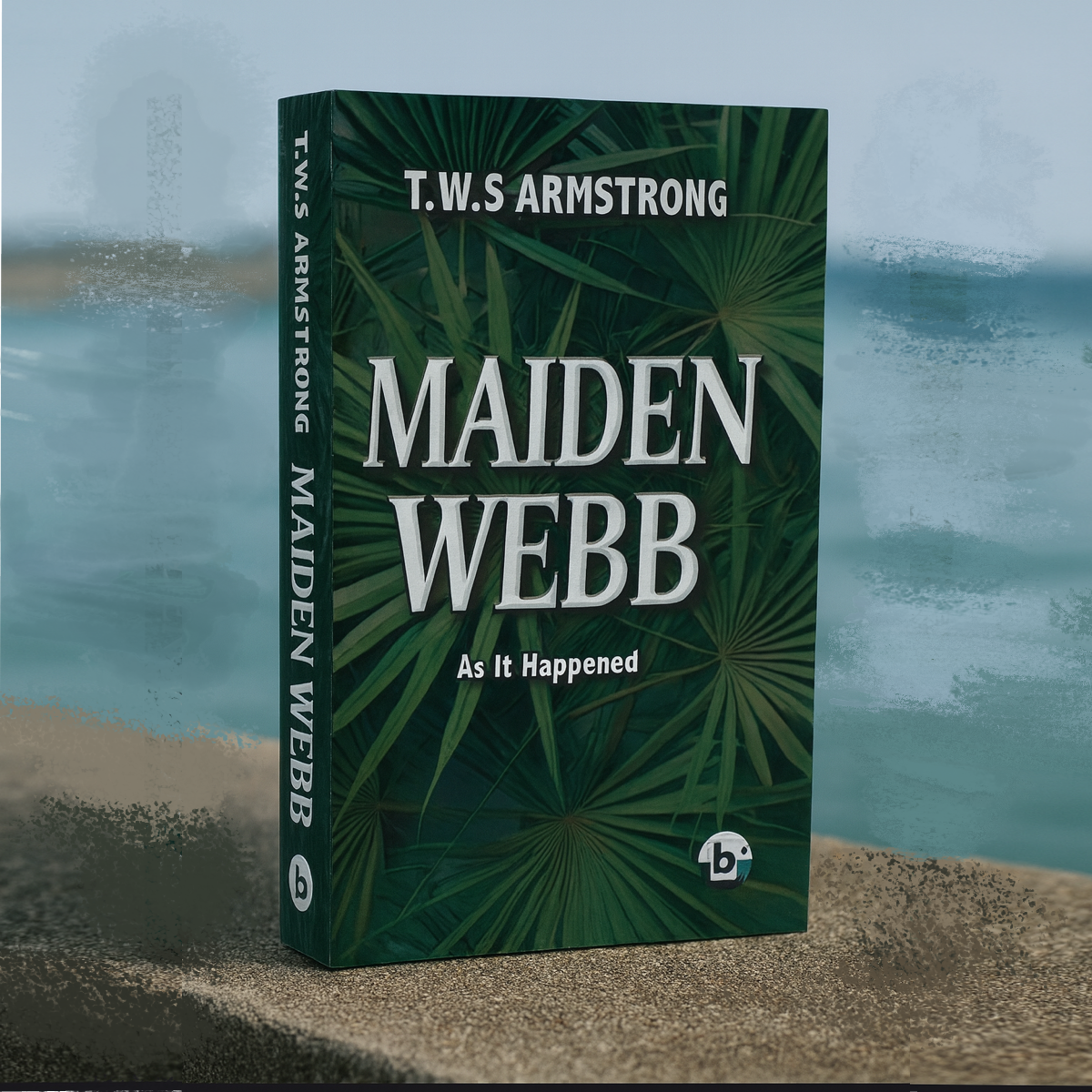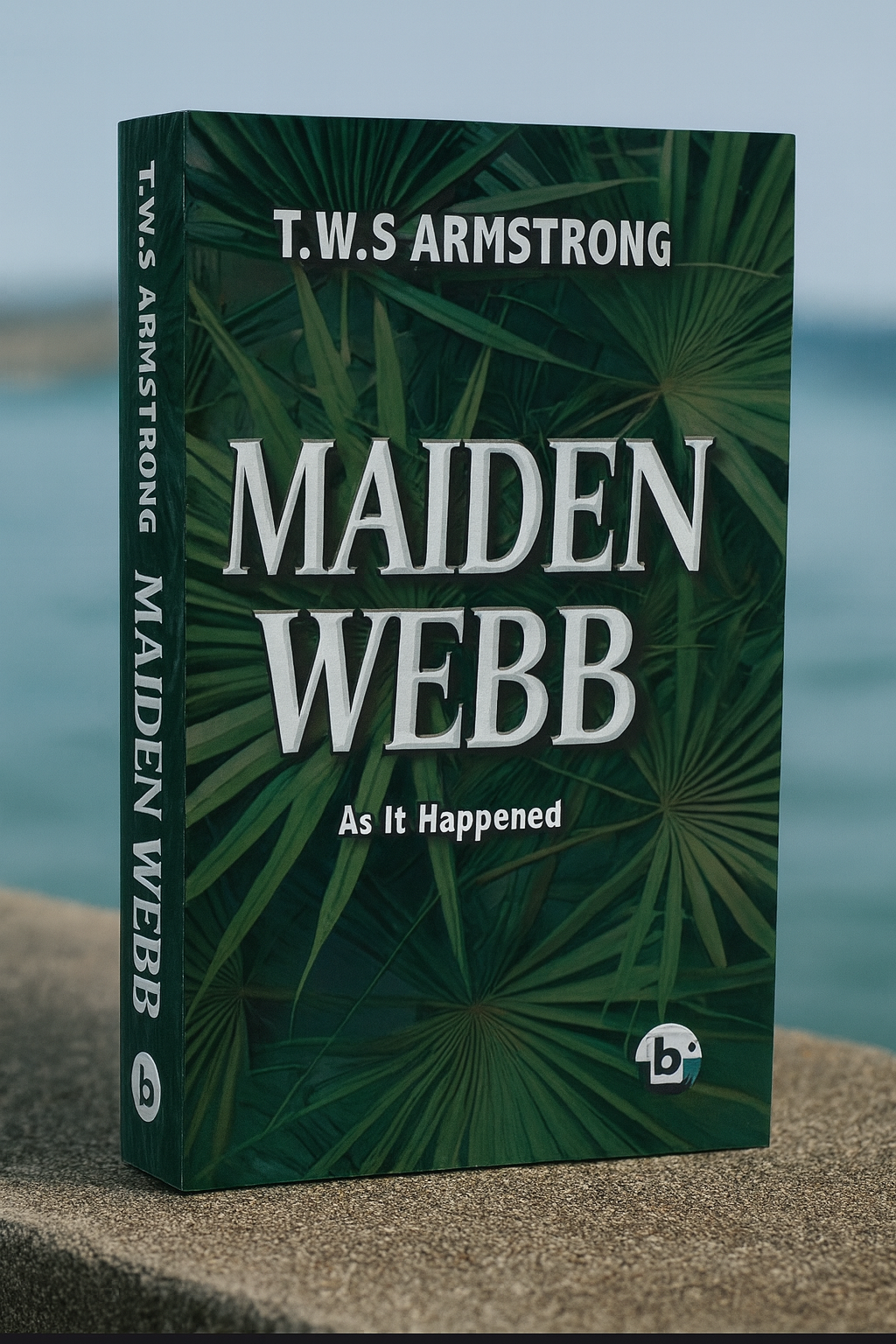
Follow along each Wednesday as the Webbs’ world unfolds — one memory at a time.
Written by Australian author T.W.S. Armstrong, Maiden Webb is a powerful new historical fiction novel set against the salt-stung breeze of post-war Wynnum, Queensland. This deeply moving Australian family saga follows six sisters and one brother growing up in a humble weatherboard house by the bay, under the devoted care of their parents, Launa and Tom Webb. Through love, laughter, and quiet endurance, the Webb family navigate hardship, hope, and the changing tides of Australia.
Blending nostalgia, resilience, and richly drawn characters, Maiden Webb captures the heart of Australian coastal life and the unbreakable bonds that hold families together through generations.

Lights of the Star
An Excerpt from ‘Edith Myra’
Written by T.W.S Armstrong
Before television flickered its way into living rooms, before shopping centres and takeaways gave families new rituals to replace the old, there was The Star Theatre. Every seaside town had its own beacon, but for Wynnum, The Star was more than just a cinema it was the heartbeat of our Fridays, Edith recalls the shining promise at the end of a long week.…
Our mother, Launa, was the anchor of our world, a woman bound to home by the weight of her love and duty to taking care of her family. Launa rarely went anywhere; she always had little kids to look after. Only when we were older did she begin to loosen her hold, allowing herself small moments of freedom, though never far from home. On Friday nights, we would set off to the movies, a sacred weekly ritual that felt like stepping into another realm. Our destination was nearly always The Star, though sometimes we’d wander over to The Imperial. The Star, with its bright marquee lights cutting through the dim evening, was our regular haunt, a place where we could forget the routines of daily life and lose ourselves in the flickering images on the screen. In winter, though, the youngest stayed home, tucked away in the warmth of the house. The journey was too long, the wind too sharp for their small frames. Instead, Launa and Mervyn would have their weekly outing—her one break, a brief respite from the demands of motherhood.
Dad, ever the stoic, would take me instead. He would walk with a steady pace, his face set against the cold, while I huddled beside him, my breath visible in small, wispy clouds. Those nights were brisk, the wind off the bay slicing through our thin coats, as merciless as it was constant. I’d shiver as we made our way back home, the sea stretching out on one side, vast and unknowable, while Walnut Street loomed in the distance, our humble destination. The cold seemed to penetrate my very bones, and Dad, noticing my silent struggle, would offer his own simple, practical kindness. “Put your hands in my pockets,” he’d say, and I’d slip my chilled fingers into the warmth of his coat, feeling the rough fabric, the steady rhythm of his walk, as though he were lending me a part of his own strength. The films at The Star or The Imperial were nearly always the same: Cowboys and Indians, tales of rugged men squinting across dusty deserts, and macho showdowns set against a blazing noonday sun. Launa and Dad seemed to have a soft spot for those Westerns, those strange, faraway landscapes of gun smoke and galloping horses. For them, these films were a brief escape, a chance to drift far from the daily toil of home, transported to that mythical frontier where good and evil played out under an endless sky.
As we grew older, our roles in these Friday night routines shifted. Launa and Dad began taking only the two littlest ones to the pictures, leaving us older children behind to mind the house. We didn’t mind, not really; it was a welcome break from our usual routines, a momentary freedom from the watchful eyes of adults. But, as with everything in our household, there was a price to pay for that freedom. Instead of relaxing, we were left with chores—mundane tasks meant to keep us occupied and useful. Polishing the lounge room floor was chief among them, and Launa, always one for vigilance, would inspect it for any spot of dust or missed corner as if her life depended on it. We, however, found a way to turn even that drudgery into an adventure. We’d sneak Julie and Barry, our neighbours, over to join us, waiting 2 until we saw Launa and Dad disappear down the road before dashing to let them in. They were supposed to be in bed, of course, but we managed to smuggle them across the yard and through the back door without so much as a whisper. Then came the grand scheme— the trick of the socks. We’d each pull on our thickest socks and grab an old, ragged towel from the laundry. I’d pour the floor polish in a lavish stream across the wooden boards, watching it gleam under the low light as though the floor were suddenly made of liquid gold. Then, we’d crank up the radio, tuning into Inner Sanctum, our favourite program, a spine-tingling series of ghost stories that crackled through the wireless in strange, warped tones. The voices—creepy and echoing, laden with suspense—added just the right touch of mischief to the night, filling the room with an eerie atmosphere that made our hearts race. With each creak and groan from the radio, we’d cast glances at one another, grinning as we were drawn deeper into those spooky tales. And then, with the polish spread out across the floor like an invitation, the fun would begin. We’d push each other across the room, gliding and sliding as if we were skating on an ice rink, each of us a blur as we shifted furniture, pushing the heavy armchairs and the solid oak table aside as if they weighed nothing.
The laughter came in waves, filling the house, our cheeks flushed and eyes bright as we dashed across the gleaming floor. We’d tumble and slip, socks damp with polish, until the room gleamed to Launa’s impossible standards, all while our laughter mixed with the chilling notes of Inner Sanctum echoing through the house. By the time Launa and Dad returned, we’d righted every chair, the room restored to its pristine order. The floor would sparkle under the lamplight, and Launa would cast us a look of approval, her eyes lingering just a moment on the polished boards, as if wondering how we managed such perfection. But she never asked too many questions; the room was spotless, after all. It was our little secret, a conspiracy of polish and socks and radio spook stories that bound us together in those small hours.
#MaidenWebb #TWSArmstrong #NewBookRelease #MustRead2026 #BookLaunch2026 #ReadersChoice #PreOrderNow #BookLoversUnite #ReadersOfInstagram #AustralianFiction #AussieAuthor #QueenslandStory #PostWarAustralia #AustralianLiterature #CoastalAustralia #WynnumStories #OutbackToOcean #HeartOfAustralia
AVAILABLE JULY 2026 ONLINE AND IN-STORE
Maiden Webb
TWS Armstrong
© 2025 billycartco. books. All rights reserved. No part of this publication may be reproduced, stored in a retrieval system or transmitted in any form or by any means, electronic, mechanical, photocopying, recording or otherwise without the prior permision of the publisher or in accordance with the provisions of the Copyright, Designs and Patents Act 1988 or under the terms of any licence permitting limited copying issued by the Copyright Licensing Agency.

